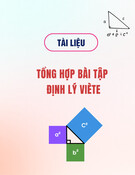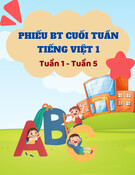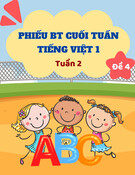
TRƯỜNG THCS MẠO KHÊ II
ĐỀ CƯƠNG ÔN TẬP KIỂM TRA GIỮA HỌC
KỲ II
NĂM HỌC 2022 – 2023
MÔN: Tiếng Anh Lớp 9 (hệ 7 năm)
A. Theory
1. Cách đọc “ed”
/id/ /t/ /d/
khi từ có tận cùng là các
phụ âm: /t/, /d/
Ex: wanted, needed
khi từ có tận cùng là các âm:
/θ/, /f/, /k/, /p/, /s/, /ʃ/, /tʃ/, /dʒ/, /ʒ/
(thường có tận cùng là các chữ:
gh, th, ph, k, p, s, ce, ge, ss, ch,
x, sh)
Ex: stopped, looked, missed,
fixed, washed, watched,laughed,
changed, practiced
khi từ có tận cùng là các
nguyên âm và các phụ âm
hữu thanh còn lại
Ex: played, opened, tried,
smiled, loved
2. Nguyên âm - Vowels (u, e, o, a, i)
a. Nguyên âm ngắn - Short vowels
-/ə/: ago, mother, together - /i/: hit, bit, sit
-/ʌ/: study, shut, must - /ɒ/: got job, hospital
-/u/: put, should, foot - /e/: bed, send, tent, spend
-/æ/: cat, chat, man
b. Nguyên âm dài - Long vowels
-/iː/: meet, beat, heat - /u:/: school, food, moon
-/a:/: father, star, car - /ɔː/: sport, more, store
-/ɜː/: bird, shirt, early
3.Trọng âm
1. Đa số động từ có 2 âm tiết, trọng âm rơi vào âm tiết thứ hai.
Ex: relax /rɪˈlæks/ produce /prə'duːs/ include /ɪnˈkluːd/ discover /dɪˈskʌvər
begin /bɪˈɡɪn/ become /bɪˈkʌm/ forget /fərˈɡet/ enjoy /ɪnˈdʒɔɪ/
2. Đa số danh từ và tính từ có 2 âm tiết có trọng âm rơi vào âm tiết thứ nhất.
Ex:action /ˈækʃn/ paper /ˈpeɪpər/ teacher /ˈtiːtʃər/
rainy /ˈreɪni/ active /ˈæktɪv/ happy (adj) /ˈhæpi/
4. Với từ có 3 âm tiết trở lên, trọng âm sẽ rơi vào âm tiết thứ 3 tính từ cuối lên.
Ex: economy /ɪˈkɑːnəmi/ industry /ˈɪndəstri/ intelligent /ɪnˈtelɪdʒənt/
specialize /ˈspeʃəlaɪz/ geography /dʒiˈɑːɡrəfi/ cinema /ˈsɪnəmə/
5. Use the connectives: and, but, because, or, so, therefore, however...
6. Adjective + that clause
- Cấu trúc này được sử dụng với các tính từ chỉ cảm xúc, sự chắc chắn, có thể như: pleased,
excited, sorry, disappointed, amazed …………..
Structure: It + be + that + S + V (bare infinitive)/ Should + V (bare infinitive)/
7. Some phrasal verbs.
Get up (thức dậy) Find out (tìm hiểu thông
tin)
Look through (đọc)

Pass down (truyền lại) Live on (sống nhờ bằng) Come back (trở lại)
Pass away (chết) Warm up (khởi động) Keep up (tiếp tục) = go on
Turn down (từ chối) Set up (sắp đặt, chuẩn bị) Hold on (chờ đợi)
Turn up (xuất hiện) Show off (khoe khoang) Count on = rely on (tin
tưởng)
Deal with (giải quyết) Grow up (lớn lên) Work out (tìm ra cách giải
quyết)
Give up (từ bỏ) = quit Carry out (thực hiện) Drop by (ghé qua)
Break down (đổ vỡ,
hỏng)
Bring out (phát hành) Bring up (nuôi dưỡng)
Take up (bắt đầu hoạt
động)
Agree on st (đồng ý việc gì)
Agree with sb (đồng ý với
ai)
Believe in (tin tưởng)
Take off (cất cánh/ cởi) Use up (cạn kiệt) Look for (tìm kiếm)
Take over (đảm nhận) Look after = take care of
(chăm sóc)
Set out/ off (khởi hành)
Take after (giống ai ) Watch out/ over (cẩn thận) Run into (tình cờ)
8. Make suggestions
Structure:
- S + suggest + V ing
- S + suggest + (that) + V + should + V (infinitive) ….
9. Revision: So… that/ Inspite of / despite …..
10. Conditional sentence type 1
If + S + V(hiện tại đơn), S + will/ can/ should/ may + V
Ex: If the weather is nice, I will go swimming tomorrow.
Diễn tả sự việc xảy ra ở hiện
tại, ở tương lai
11. Relative clause
a. Các dạng mệnh đề quan hệ
Mệnh đề quan hệ xác định Mệnh đề quan hệ không xác định
Dùng để xác định danh từ đứng
trước nó.
Mệnh đề xác định là mệnh đề
cần thiết cho ý nghĩa của câu,
không có nó câu sẽ không đủ
nghĩa.
Không thể bỏ đi đc
Không có dấu (,)
Cung cấp thêm thông tin về 1 người/ vật
Có thể bỏ đi đc
Có dấu (,)
MĐQHKXĐ dùng khi:
+ Danh từ mà nó bổ nghĩa là 1 danh từ riêng (tên riêng, tên
địa danh)
Ex: Ha Noi, which is a capital of Vietnam, is crodwed and
modern.
+ Danh từ mà nó bổ nghĩa là 1 tính từ sở hữu (my/ his/ her/
their/ your/…)
Ex: My cat, which I found on the street, is called Monty.
+ Danh từ mà nó bổ nghĩa là danh từ đi với this/ that/ these/
those
Ex: This ring, which was a present from my husband, is very
valuable.
- Không dùng “that”
b. Các đại từ quan hệ

1. WHO:
- thay thế cho danh từ chỉ người.....
- Cấu trúc: N (person) + WHO + V + O
N (person) + WHO + S + V
- Ví dụ: I told you about the woman who lives next door.
I live the man who Mary loves.
2. WHOM:
- thay thế cho danh từ chỉ người
- Cấu trúc: .....N (person) + WHOM + S + V
- Ví dụ: I was invited by the professor whom I met at the conference.
3. WHICH:
- thay thế cho danh từ chỉ vật
- Cấu trúc:
....N (thing) + WHICH + V + O
....N (thing) + WHICH + S + V
- Ví dụ:
+ Do you see the cat which is lying on the roof?
+ The dress which she is wearing is beautiful.
4. THAT:
- có thể thay thế cho vị trí của who, whom, which trong mệnh đề quan hệ quan hệ xác định
* Các trường hợp thường dùng "that":
- khi đi sau các hình thức so sánh nhất
- khi đi sau các từ: only, the first, the last
- khi danh từ đi trước bao gồm cả người và vật
- khi đi sau các đại từ bất định, đại từ phủ định, đại từ chỉ số lượng: no one, nobody, nothing,
anyone, anything, anybody, someone, something, somebody, all, some, any, little, none.
Ví dụ:
+ He was the most interesting person that I have ever met.
+ It was the first time that I heard of it.
+ These books are all that my sister left me. 0983672757
+ She talked about the people and places that she had visited.
* Các trường hợp không dùng that:
- trong mệnh đề quan hệ không xác định ( có dấu (,))
- sau giới từ
5. WHOSE:
- dùng để chỉ sở hữu cho danh từ chỉ người hoặc vật, thường thay cho các từ: her, his, their, hoặc
hình thức 's
- Cấu trúc....N (person, thing) + WHOSE + N + V ....
- Ví dụ: Do you know the boy whose mother is a nurse?
C, Các trạng từ quan hệ
1. WHY: mở đầu cho mệnh đề quan hệ chỉ lý do, thường thay cho cụm for the reason, for that
reason
- Cấu trúc: ......N (reason) + WHY + S + V ...
Ví dụ: I don’t know the reason. You didn’t go to school for that reason.
→ I don’t know the reason why you didn’t go to school.
2. WHERE: thay thế từ chỉ nơi chốn, thường thay cho there
- Cấu trúc: ....N (place) + WHERE + S + V ....

(WHERE = ON / IN / AT + WHICH)
Ví dụ: The hotel wasn’t very clean. We stayed that hotel.
→ The hotel where we stayed wasn’t very clean.
→ The hotel at which we stayed wasn’t very clean.
3. WHEN: thay thế từ chỉ thời gian, thường thay cho từ then
Cấu trúc: ....N (time) + WHEN + S + V ...
(WHEN = ON / IN / AT + WHICH)
Ví dụ: Do you still remember the day? We first met on that day.
→ Do you still remember the day when we first met?
→ Do you still remember the day on which we first met?
B. PRACTICES:
I: Listening
II: LANGUAGE FOCUS.
BT 1. Khoanh vào đáp án đúng
1. They have turned (down/ up) Jim's application for the job.
2. You may have to deal (with/ about) many problems in the workplace.
3 . Small birds mainly live (on/ off) insects.
4. When does the plane take (off/ up)?
5. Why did you decide to take (on/ up) skiing?
1. A. head B. please C. heavy D. measur
2. A. note B. gloves C. some D. other
3. A. now B. how C. blow D. amount
4. A. dear B. year C. wear D. disappear
5. A. hate B. pan C. carrot D. matter
6. A. improved B. returned C. arrived D. stopped
7. A. nervous B. scout C. household D. mouse
8. A. favorite B. find C. outside D. library
9. A. last B. taste C. fast D. task
10. A. future B. summer C. number D. drummer
BT 2. Chọn đáp án đúng
1. I wish I _______ speak Spanish.
A. should B. could C. can D. will
2. My sister wishes she _______ to play the piano when she was young.
A. learnt B. would learn C. had learnt D. would have learnt
3. I wish someone _______ to help me with that word tomorrow.
A. offer B. offered C. would offer D. had offered
4. I wish I _______ there for my holiday year. I didn’t enjoy it.
A. didn’t go B. hadn’t gone C. wouldn’t go D. would rather go
5. He wishes he _______ the examination last month.
A. didn’t fail B. hadn’t failed C. weren’t failing D. couldn’t have failed
BT 3: Chia động từ trong câu điều kiện loại 1
1) If I (study)____________, I (pass) ___________ the exams.
2) If the sun (shine)____________, we (walk) ____________to the town.
3) If he (have) ___________a temperature, he (see) ____________the doctor.
4) If my friends (come)_____________, I (be) ______________very happy.

5) If she (earn) _____________a lot of money, she (fly) _____________to New York.
BT 4-Tìm lỗi sai trong mỗi câu sau và sửa lại cho đúng
1. Nam asked Mai what can he do to help her.
A B C D
2. Your friends went to your native village last weekend, weren't they?
A B C D
3. I'd like to go out for dinner, but I don't feel like to eat out tonight.
A B C D
4. Summer in England is the better season of all.
A B C D
5. If we would have a large garden, we would plant a lot of flowers in
A B C D
READING
BT 5. Đọc đoạn văn và chọn từ/ cụm từ đúng để điền vào chỗ trống sau
The coronavirus is a kind of virus. Viruses are tiny germs that are so small that you can’t see
them. They are so (1) _______ that they can float through the air in tiny drops of water, and they
can sit on your skin without you feeling them. If some of these germs get inside you, they can use
your body to make more germs, and that can make you ill.
There are lots of different sorts (2) _______ coronaviruses and some of them infect people. If
you have been infected with one of these coronaviruses, all you probably (3) _______ was a
snotty nose or a cough.
But when this completely new coronavirus germ gets inside a human body, it causes (4)
_______ illness called COVID-19. When people talk about "catching the coronavirus", they are
talking about this illness. Because this coronavirus is new, scientists don’t know everything about
it yet. But they think that there are two main (5) _______ that people can catch it.
1.A. big B. small C. light D. heavy
2.A. about B. for C. with D. of
3.A. had B. made C. took D. caught
4.A. a B. an C. the D. Ø
5.A. roads B. ways C. behaviours D. habits
WRITING.
BT 6. Rewrite sentences with the meaning unchanged.
1) Although Tom was a poor student, he studied very well.
=> In spite of ……
2) Mary could not go to school because she was sick.
Because of ….
3) Although the weather was bad, she went to school on time.
=> Despite ….
4) My mother told me to go to school although I was sick.
=> In spite of ….
5) Because there was a big storm, I stayed at home.
=> Because of ….
6) I advise them to work harder for their important exam.
- They should…………………………………………….
THE END



![Tài liệu tham khảo Tiếng Anh lớp 8 [mới nhất/hay nhất/chuẩn nhất]](https://cdn.tailieu.vn/images/document/thumbnail/2025/20250806/anhvan.knndl.htc@gmail.com/135x160/54311754535084.jpg)










![Phiếu bài tập cuối tuần Tiếng Việt 1 tuần 2 đề 2: [Hướng dẫn chi tiết]](https://cdn.tailieu.vn/images/document/thumbnail/2025/20250728/thanhha01/135x160/42951755577464.jpg)

